Dr. Judith Orloff – Empathy as a Catalyst for Healing & Compassion | Digital Download
$199.00 $89.00
Digital Product
Dr. Judith Orloff – Empathy as a Catalyst for Healing & Compassion
Work directly with Dr. Judith Orloff, a pioneer in her work with empaths and highly sensitive people, to learn how to use your superpower of empathy more effectively — through the art of healthy giving, active listening, and holding sacred space.
Explore the neuroscience behind empathy — including the biological basis of being wired for sensitivity and how to work with your own biology for healthier relationships.
Join us for Dr. Orloff’s brand-new live video course as she shares practices and techniques to help you develop your gifts of empathy while creating strong boundaries so you can heal, awaken, and lead with heart.
During this course, you’ll identify your main style of empathy — there are four styles, Cognitive (the thinker/fixer), Emotional (the feeler), Intuitive (the subtle senser), or Spiritual (the mystic). You’ll also learn how to discern the empathy styles of those around you — so you can improve communication as you embrace everyone’s strengths and vulnerabilities.
With Dr. Orloff’s guidance, you’ll learn practices to heal loneliness and isolation, expanding your capacity for love. Tune into your intuition for guidance to make empathic decisions for your life.
And nurture and maximize your empathy to enrich your life, relationships, and the world — while avoiding taking on the stress of those around you.
In this 7-week online course, you’ll:
- Tap into the wisdom of both your heart and mind to manifest greater healing with the full power of empathy
- Discover whether your empathy style is Cognitive (the thinker/fixer), Emotional (the feeler), Intuitive (the subtle senser), or Spiritual (the mystic) — and how to optimize it
- Practice empathic listening — consciously giving your time, focus, and compassion to someone who needs to be heard
- Learn to utilize self-empathy in various situations, including when you’re experiencing illness and pain, or when a loved one is suffering
- Explore the neuroscience of empathy — including techniques to soothe your nervous system (vagus nerve regulation, mirror neurons, dopamine, oxytocin, and sensory processing sensitivity)
- How to express empathy for loved ones as well as people you don’t like or agree with — even during arguments
- The 3 A’s of empathic responses: attitude, attention, and adjustment
- Discover the art of healthy giving — caring deeply without becoming a martyr, overgiving, or burning out
- Identify narcissists, sociopaths, psychopaths, bullies, and others who are not wired neurologically or emotionally to have empathy
- Release old resentments with the grace of forgiveness
- Bring empathy into every area of your life with weekly group meditations and practices
Who do you want to be as an empath or HSP? What kinds of relationships are good for you? How can you practice self-care and protect your energy from people or situations that are depleting, or not right for you?
Explore all these questions and many more during this 7-week journey to use empathy to connect with yourself and others in deeper ways.
Over the years, many of Dr. Orloff’s patients and workshop participants have found empathy to be the missing element to calm their nervous systems and bring harmony and ease into their lives.
Drawing on Dr. Orloff’s personal journey of awakening as an empath and by sharing patient success stories, you’ll recognize practical examples of what healthy empathy looks like in the world, so you can cultivate it in your own life.
What You’ll Discover in These 7 Weeks
In this 7-week transformational course, Dr. Orloff will guide you through the fundamental skills and competencies you’ll need to successfully create healthy empathic practices to heal, awaken, and communicate with heart.
Part 1: Healing Yourself
Module 1: Ignite the Powerful Healing Energy of Empathy to Stop Overthinking & Live From Your Heart (November 28)

Empathy is a potent healing force, a life-saving skill you can develop to navigate both adversity and happiness. Sympathy, by contrast, is mainly feeling sad for someone else’s distress.
Having empathy for yourself and others offers solace when you feel overwhelmed, in pain, empty, or are losing faith in your purpose — and when you want to revel in the sheer joy of caring and giving.
Empathy is the antidote to the frantic state of over-thinking and chronic worry. Connecting with your heart can help heal your pain and stop clutching onto stories about the past.
Empathy is an energy shifter that begins with you — and expands outward to others and the world to create beneficial change.
In this module, you’ll explore:
- Whether your empathy style is Cognitive (the thinker/fixer), Emotional (the feeler), Intuitive (the subtle senser), or Spiritual (the mystic) — and how to optimize it
- The difference between empathy and compassion
- The potential downsides of empathy, including the risks of losing touch with your common sense, becoming vulnerable to taking on others’ pain, and more
- 5 strategies to combat overthinking
- The neuroscience of empathy — including techniques to soothe your nervous system (vagus nerve regulation, mirror neurons, dopamine, oxytocin, and sensoryproce ssing sensitivity)
- The “Mother Teresa Effect”— how witnessing one act of empathy can increase your immune response
- An experiential group mediation to ignite the healing power of empathy in your own body, open your heart, and feel the healing effects of empathy within
Module 2: Create a Light-Filled Energy Field to Heal Yourself With Self-Empathy (December 5)

Self-empathy is a commitment to relating to yourself in a caring way, rather than shaming or punishing yourself — especially when you’ve fallen short.
Perhaps your first impulse is to push too hard or get impatient with your progress. Or you may beat yourself up for your insecurities or perceived “faults,” mimicking how your family, teachers, or partners treat you.
Dr. Orloff likens this kind of self-punishment to an autoimmune disease where your immune system attacks parts of your body. How you treat yourself affects your health and wellbeing.
If you long to heal this pattern and practice self-empathy, you’re on the way to enjoying yourself and your life.
In this module, you’ll discover:
- How self-empathy can create a heart- and light-filled energy field that heals yourself and others
- Your self-empathy score
- How to heal past conditioning that told you it’s selfish to show empathy for yourself
- Why self-empathy is a crucial part of self-care for empaths and all caring people
- How to practice self-empathy in various situations, including when you’re experiencing illness and pain, or when a loved one is suffering
- A guided healing practice to rejuvenate a state of self-empathy
Part 2: Healing Your Relationships
Module 3: Empathic Listening to Hold Sacred Space While Keeping Your Energy High (December 12)

Discover the powerful art of empathic listening. It’s a warm and wonderful feeling when someone really listens to you.
They’re simply being present for you in a generous, accepting, and supportive way. You’re not fighting for your listener’s attention, and they aren’t argumentative, talking about themselves, or offering unsolicited advice.
Empathic listening is a way to help heal others through the quality of your presence and attention. You consciously give your time, focus, and compassion to someone who needs to be heard.
Dr. Orloff will show you how to practice empathic listening — even if you don’t agree with or even like someone.
You can still help them feel heard, and gain a more realistic view of where even the most difficult people are coming from.
In this module, you’ll explore:
- How to cultivate the power of eye contact, body language, and holding sacred space
- 4 strategies to respond with empathy — sticking to one topic at a time, no distractions, making a request to set a time to talk, and venting vs. dumping
- The dos and don’ts of empathic listening
- The 5 steps to empathic listening
- Conscious breathing and shielding as protection techniques
- A group mediation to hold space for another without taking on their emotions or stress
Module 4: Practicing Empathetic Communication to Connect With Others Even When You Don’t Like Them (January 2)

It’s human to yearn for connection, acknowledgment, and belonging.
Perhaps you long for just one trusted friend to confide in a loved one to hold you. You may wish that your siblings would stop fighting so your family can be whole. Or you may want team members at work to simply respect each other’s opinions.
To create happier relationships and heal conflicts with people over time, empathy is crucial, says Dr. Orloff.
Expressing empathy in daily activities and at work is magical and healing.
The genius of empathy is that it’s a form of rapport you can establish with people you love — as well as with those you may not even like.
The genius of empathy is that it’s a form of rapport you can establish with people you love — as well as with those you may not even like.
Empathy lets you keep your heart open and withstand a relationship’s inevitable tough spots with even the prickliest people. It will also rescue you from the brink of acting in regrettable ways.
In this module, you’ll explore:
- The repair vs. rupture model for reimagining empathy in relationships
- How to set clear emotional and energetic boundaries without alienating people
- 5 guidelines for empathic responses
- How to be an empathic leader at home, at work, and in every area of your life
- How to express empathy for loved ones as well as people you don’t like or agree with — even during arguments
- The 3 A’s of empathic responses: attitude, attention, and adjustment
- Types of difficult personalities at work and how empathy can improve your relationships with them
- An experiential group visualization of showing empathy to one other person, feeling centered in your heart and unshakable in your power
Module 5: Healthy Giving — Caring Without Being a Martyr, Overgiving, or Burning Out (January 9)

You might wonder, How can I be a giving person without burning out? How can I be compassionate without absorbing others’ stress?
Dr. Orloff will show you how to put empathy into action so you don’t risk compassion fatigue and exhaustion that can come from being a super-giver or from over-helping.
A mindful approach to energy-in and energy-out will protect your wellbeing, support your immune system, and improve the quality of your relationships.
Giving is beautiful, yet many people sacrifice the last molecule of their being trying to help someone who may not have even wanted their help. Or they exhaust themselves by trying to fix others.
As Dr. Orloff will explain, to maximize how your giving can heal others and yourself, you must learn to remain discerning and balanced.
In this module, you’ll explore:
- How to train yourself to utilize empathy in balanced ways — to see people clearly, and not burn out
- The 9 traits of a healthy giver
- A self-inventory quiz — Are You a Codependent Giver?
- The neuroscience of healthy giving
- How to stop absorbing other people’s pain and stop thinking your job is to fix others
- The sacredness of being a caregiver — and the importance of practicing empathy and self-care
- How to empathize with loved ones who are going through a health challenge or are in chronic pain — without burning out
- A guided meditation to give off loving energy without absorbing the other person’s energy — and make a conscious decision to not live in the martyr archetype
Module 6: Understanding Empathy Deficit Disorder to Combat Narcissists, Sociopaths, Psychopaths & Bullies (January 16)

Some people are not wired neurologically or emotionally to have empathy — a condition behavioral scientists define as empathy deficit disorder.
Those with empathy deficit disorder lack a moral compass. They focus on their own needs and neglect — or don’t care about — the feelings of others.
Dr. Orloff will train you to recognize these damaging and cleverly deceptive personalities — all of whom can be bullies — so you won’t be seduced by their charm or empty promises.
As she’ll explain, to protect your own empathy, you must realize they are not your allies.
Focus on how you can keep your power around these kinds of people and have empathy for their wounds while maintaining your healthy boundaries.
In this module, you’ll discover:
- How to identify people with empathy deficit disorder
- 9 common traits of a narcissist
- 4 ways to protect yourself from a narcissist — including the gray rock method
- How to recognize sociopaths and psychopaths
- Ways to end a relationship with someone who has empathy deficit disorder by “cutting off their supply”
- How to recognize and deal with bullies in a constructive way
- An experiential group meditation to reclaim your power from someone who has empathy deficit disorder
Part 3: Healing the World
Module 7: Release Resentments, Build Empathy & Cultivate Positive Energy With the Grace of Forgiveness (January 23)

You can forgive someone and release bitterness and resentments so these feelings don’t deplete you.
The path of empathy provides a way out of suffering from past hurts. Forgiveness lifts the weight of resentments, and is more about healing yourself than changing the person who harmed you.
Focus on how forgiveness can heal you and allow you to experience relief from emotional burdens and bitterness.
Learn the connection between empathy and forgiveness so you can experience more healing in the relationships in your life.
In this final module, you’ll explore:
- How empathy can help you develop forgiveness for yourself, others, and the world
- The possibility of forgiving even horrific situations when it intuitively feels right to do so
- Healing the aching, empty place within you by forgiving yourself
- Tapping into the spiritual energy of empathy
- Activating your prayer body to develop global empathy for our human family
- The power of empathic leadership — how empathy creates more positive energy in your own body and in the world
- A group meditation to send heart energy out to the world to increase our planet’s goodness, healing, and empathy
Get Dr. Judith Orloff – Empathy as a Catalyst for Healing & Compassion at Tradersoffer.forex
Be the first to review “Dr. Judith Orloff – Empathy as a Catalyst for Healing & Compassion | Digital Download” Cancel reply
Related products
-88%
-83%
HYPNOSIS - NLP Courses
Doña Eugenia Pineda Casimiro – The Healing Potential of Sacred Mushrooms
$95.00
-82%
HYPNOSIS - NLP Courses
Rated 5.00 out of 5
-88%

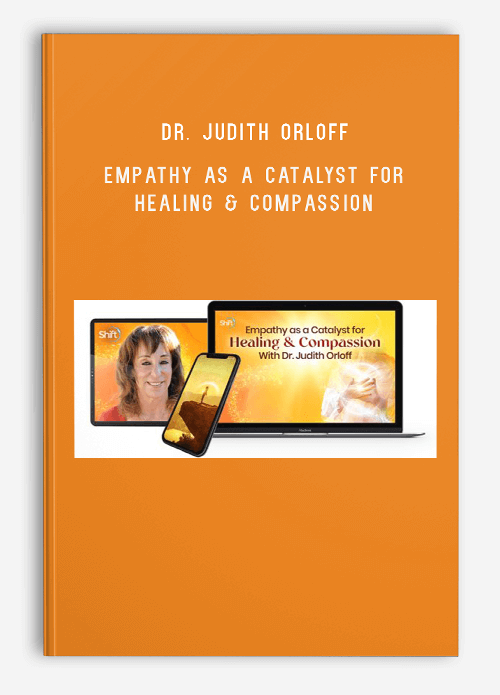
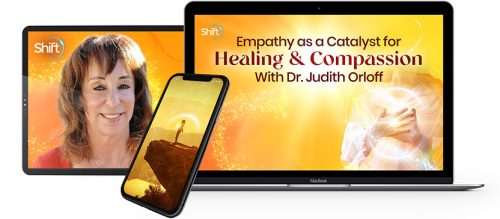

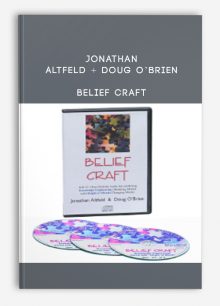



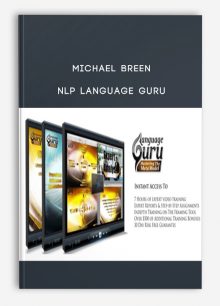

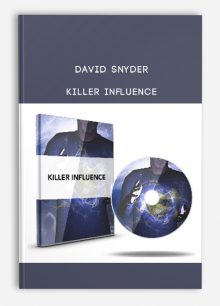
Reviews
There are no reviews yet.